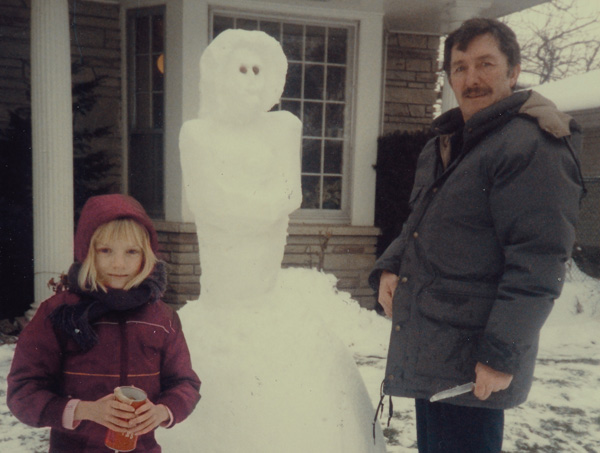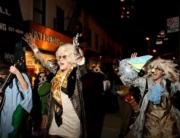So many fiction films open with the set-up of a faux biographer or documentarian sitting down with an old man and asking a question like: “Tell me the whole story of your marriage.” But in Stories We Tell, this interrogator adds “to mom” and she’s Sarah Polley, who has been in the public eye since she was a beloved 1980’s/1990’s child star in TV’s Ramona and Avonlea, before she became an Oscar-nominated writer/director of the sensitive marriage dramas Away From Her (2006) and Take This Waltz (2011). But as a Canadian celebrity, her life hasn’t been that public. Until now. Starting with her father—and directing him to re-narrate his memoir until she’s satisfied with his crisp, British delivery—she points her camera at every member of her family so each can offer their version of the truth. Her personal quest to delve into secrets and relationships, and how that affects their perceptions of themselves as a family, has provocative resonance to other families and to any documentary that reexamines the remembered past.
It’s a Rashomon tale of growing up where the person at the center of the discussion is her mother Diane, who died when Sarah, the baby of the family, was 11. The family closed ranks to raise her, especially her doting father, so what she thinks are memories of her mother may be just what they’ve told her, even of the funeral. But family gatherings with much older siblings turned to teasing as they regaled her with frank talk about their parents’ mismatched sensuality and who really was her father. (We had jokes about “the iceman” in my mixed family of brunettes and redheads.)
This film reconstructs how she set out to put the jokes to rest and consider the alternative possibilities. Her parents met acting in a play and whatever they did afterwards there was always a theatrical flair. Diane’s whirlwind personality sounds like near-manic, making a big impression on everyone who knew her, and Polley interviews a widening circle of her mother’s relatives, friends, and colleagues.
The complexities of her parents’ earlier and intermittent relationships are gradually revealed to the audience, and the impact of the past gets sorted out in the present. It’s always hard for people to perceive their parents clearly from before they were born, and Polley imaginatively fills in the past to consider them through a hybrid of documentary and fiction. She follows her mother’s footsteps, with some scenes reenacted as flashbacks, and through performance photographs that may or may not be archival. Many images get repeated, with slight changes or for reinterpretations, and you could get a bit of a headache if you try too hard to discern what is real as they recur. But the blending of fantasy and reality reflects Polley’s own experiences, as when a camera caught her finding out important family news wearing a Neanderthal costume on break from a movie set. And the revelations continue through the credits.
Each relative and friend debates what is the whole truth—their point-of-view, another’s, some combination, all of them together, or just facts? Or is it only Diane’s story that no one else has the right to tell? Besides how fascinating the revelations are, told by people who appreciate that this is a good story and are entertaining storytellers, Polley’s approach has knowing relevance to oral history, testimonial evidence, and helps define what makes a family, especially for other films about parents, adoption, and even sperm donors. Stories We Tell will make every viewer consider what makes up their personal identity.







Leave A Comment